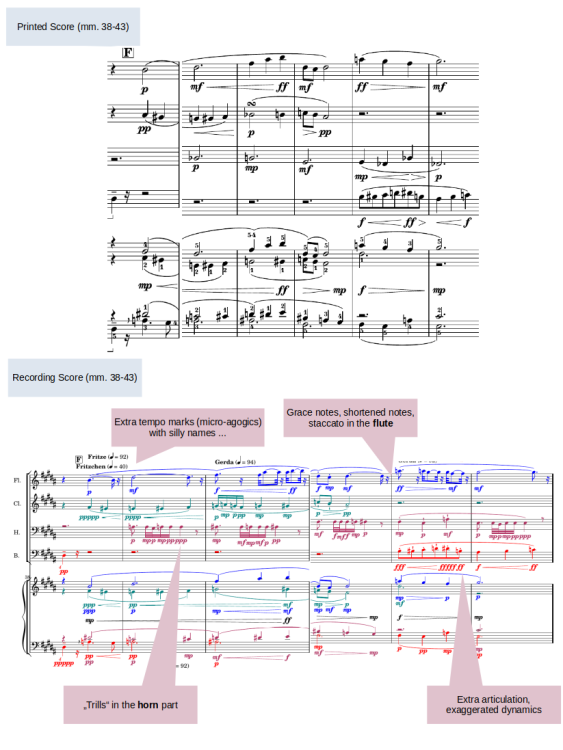All Activity
- Past hour
-
Apatite - Short Orchestral/Vocal Sketch (score + audio)
TristanTheTristan replied to Burlap Guy's topic in Choral, Vocal
Sorry, Ignore the previous post. It is too messy. Hi There! Welcome to YC! Anyways, I can clearly hear from the start of what tone you want it to be like. I favor that part from measures 49-76. It generally gives a Coda feeling. You might be wondering: @TristanTheTristan, why didn't you just write from bars 49-the end? That is because, you had outlying part at the end for piano solo, which doesn't feel like it was needed. I will be analysing most bars by themselves here. Interesting, slightly prokofiev-like ideas. Is intended to sound very slightly off-beat by the end? The following is quite a smart idea that plays with syncopation. Nice! (Harp) No. Rename it to just 'Piano (Right hand)'. It is not grand at all. It barely plays anything at all. It usually plays a note and then rests. Other times it is just playing eighths. You are not using the bass either, so rename Piano (Right Hand). Also notice that you are using the simplest chords possible at most times. I, IV, V, not even using the relative minor which would be VI. I listened through the full 3 minutes and whatever something seconds and I didn't find a hint of other chords. You should study pieces like Fantasie Impromptu by Frederyk Chopin Op. Posth. 66, by NOT LISTEN TO IT AND ENJOY IT, but instead study the chords he has used. Study Gaspard de Le Nuit's Ondine by Maurice Ravel M.55 in the same way. Apatite is supposed to be glowing-like. This feels too straight-forward. Music isn't like that. In musical composition you use your brain to find ways to describe it. It is just like the technique in lingual-writing: Show don't tell. You are telling. Good composers show. If you tell it, it might be a lie, but if you show it, you couldn't be lying. Listen, you know what, here is something: on discord I am friends with Meliton Soupelin; you probably know about him. At the start of my composition journey, he has given me great advice. Exactly the following: "Also, if you are at the start of your composition journey, I strongly warn against trying to compose large pieces. Start with small pieces and work your way up with progressively larger pieces only when you are satisfied with the results of the smaller compositions.Your quality of work will substantially increase. I used to compose like you when I was younger. I forced myself into studying my favorite pieces and trying to understand each technique the composers used, and apply them myself. I did not merely pay attention to melody and technique, but also harmony and structure. It was a humbling but very reward experience.That is my only advice. Few people have the bravery to take it. They usually get mad and leave in a huff. But the ones who did follow my advice have made significant improvements as composers." -Meliton Soupelin. I took his advice of forcing myself into studing my favourite pieces and composers and their techniques and everything. I studied Polonaise Fantasie for hours. Then, I continued with the next piece, and then the next. As he said, it DOES in fact take much effort, but worth it. I now see, that he was correct all the way, and I am glad I took his advice. Even now I am using this technique, and as a composer I have wrote much better pieces than before. I wish you listen to my advice. Have a nice compositional life. Remember, Every composer goes through different things. You don't have to take my advice if you don't want to. It is your choice whether you want to regret it or not. Bye. -TristanTheTristan 03/11/2025 -
TristanTheTristan started following Apatite - Short Orchestral/Vocal Sketch (score + audio)
-
Apatite - Short Orchestral/Vocal Sketch (score + audio)
TristanTheTristan replied to Burlap Guy's topic in Choral, Vocal
MP3 Play / pause Apatite - Studio — Mozilla Firefox 2025-08-09 13-12-57 0:51 3:06 volume > next menu Apatite - Studio — Mozilla Firefox 2025-08-09 13-12-57 > next PDF apatit Hi There! Welcome to YC! Anyways, I can clearly hear from the start of what tone you want it to be like. I favor that part from measures 49-76. It generally gives a Coda feeling. You might be wondering: @TristanTheTristan, why didn't you just write from bars 49-the end? That is because, you had outlying part at the end for piano solo, which doesn't feel like it was needed. I will be analysing most bars by themselves here. Interesting, slightly prokofiev-like ideas. Is intended to sound very slightly off-beat by the end? The following is quite a smart idea that plays with syncopation. Nice! (Harp) No. Rename it to just 'Piano (Right hand)'. It is not grand at all. It barely plays anything at all. It usually plays a note and then rests. Other times it is just playing eighths. You are not using the bass either, so rename Piano (Right Hand). Also notice that you are using the simplest chords possible at most times. I, IV, V, not even using the relative minor which would be VI. I listened through the full 3 minutes and whatever something seconds and I didn't find a hint of other chords. You should study pieces like Fantasie Impromptu by Frederyk Chopin Op. Posth. 66, by NOT LISTEN TO IT AND ENJOY IT, but instead study the chords he has used. Study Gaspard de Le Nuit's Ondine by Maurice Ravel M.55 in the same way. Apatite is supposed to be glowing-like. This feels too straight-forward. Music isn't like that. In musical composition you use your brain to find ways to describe it. It is just like the technique in lingual-writing: Show don't tell. You are telling. Good composers show. If you tell it, it might be a lie, but if you show it, you couldn't be lying. Listen, you know what, here is something: on discord I am friends with Meliton Soupelin; you probably know about him. At the start of my composition journey, he has given me great advice. Exactly the following: "Also, if you are at the start of your composition journey, I strongly warn against trying to compose large pieces. Start with small pieces and work your way up with progressively larger pieces only when you are satisfied with the results of the smaller compositions.Your quality of work will substantially increase. I used to compose like you when I was younger. I forced myself into studying my favorite pieces and trying to understand each technique the composers used, and apply them myself. I did not merely pay attention to melody and technique, but also harmony and structure. It was a humbling but very reward experience.That is my only advice. Few people have the bravery to take it. They usually get mad and leave in a huff. But the ones who did follow my advice have made significant improvements as composers." -Meliton Soupelin. I took his advice of forcing myself into studing my favourite pieces and composers and their techniques and everything. I studied Polonaise Fantasie for hours. Then, I continued with the next piece, and then the next. As he said, it DOES in fact take much effort, but worth it. I now see, that he was correct all the way, and I am glad I took his advice. Even now I am using this technique, and as a composer I have wrote much better pieces than before. I wish you listen to my advice. Have a nice compositional life. Remember, Every composer goes through different things. You don't have to take my advice if you don't want to. It is your choice whether you want to regret it or not. Bye. -TristanTheTristan 03/11/2025 -
Hi @NugDumDum The opening the thematic structure is sentence form. m1-8 is the presentation; where the following the contin. Then it looks have the liquidation? However, phrase structure is rather peculiar. You have 8 measure melodic phrases. This is rather irregular in common practice. Further, it is hard seeing what two ideas are you are using in the waltz. You should probably reconsider shortening the phrases to 4 measures. I am not sure how the motivic material in b. 21 is related. I think it would be better start the middle section with pedal, elimating the material before that, that way you have way to modulate to the key from the pedal point. The irregular rythmn patterns in 6/8 is interesting, and would be make challenging for even the most experience pianist. Perhaps, find a way to make those rythmns to easier to read. After the middle section, you also need transition back to main section. It seems so abrupt. The modulation is just flow naturally. I feel this is more of rondo (ABACA) form. Maybe, look at how rondo how writtens in sonata and etc. 🙂
-

Poll - 2025 Halloween Competition
Kvothe replied to PeterthePapercomPoser's topic in Monthly Competitions
Voted. - Today
-

Apatite - Short Orchestral/Vocal Sketch (score + audio)
Thatguy v2.0 replied to Burlap Guy's topic in Choral, Vocal
sup The notes are readable, but it's like if I told you "baseball me like" instead of "I like baseball". You're using a DAW, so things like string section 1-4, single piano whole notes, 2 voices in the flutes when you probably didn't mean it, are pretty obvious things that jump out that shouldn't be there. I get what you're trying to do, but that midi seems pretty simple; it might be worth it to type in by hand the notes in musescore or something to better practice. This seemed like incidental music, like film music, and I didn't really hear much for melodies except the repeated motif like 2 minutes in. I think as it's written it'd work best to depict a scene rather than a stand alone orchestra piece. Maybe that's what you're going for? Improvements? Thicker textures, your chords are pretty bare. Maybe study up on melody (Mozart and Chopin are some of my favorites for that) to help in that department. Honestly, if you REALLY want to get better, keep writing for piano and small ensembles, the orchestra can wait. Work on simple things, like 2 note counterpoint. You'll learn a lot about harmony, and the more interesting you can make simple music, the better your works of grand scale will be. Also, not sure on that ending. Just seemed out of place. But, great work nonetheless, and thanks for sharing! Some people like to keep updating the same thread as they work on something, but other times we may hear back from you a few months down the line with the final version of this. Either is fine, just keep up the writing 😄 -
.thumb.png.1e2763f479362bbb522da50d31ef2e50.png)
Poll - 2025 Halloween Competition
therealAJGS replied to PeterthePapercomPoser's topic in Monthly Competitions
done. -
Melodies Themes Motives Harmony Chords Textures Form Development Structure Time Originality Creativity Score Presentation Instrumentation Orchestration Playability Execution of Given Challenge Taste 9 8 8 10 7 10 9 9 8.75
-
Rate my 3rd Sonata!
TristanTheTristan replied to TristanTheTristan's topic in Piano Music, Solo Keyboard
Can someone please review this? Thx! -
TristanTheTristan started following Landscape Travel Notes , Op.60 2nd mvt and Ghost Party
-
piano solo Op.60 2nd mvt
TristanTheTristan replied to Demertzis's topic in Piano Music, Solo Keyboard
Nice piece! Do you have the sheet music so that I can review? -
Do you have the sheet music? 有谱吗?
-
therealAJGS started following Peter031
-
Poll - 2025 Halloween Competition
TristanTheTristan replied to PeterthePapercomPoser's topic in Monthly Competitions
Oh, wait, actually, can you put me after ones' own name, after the sentence please? That is because I have also given feedback to myself... (Just a joke again, but you can take it seriously...) -
Poll - 2025 Halloween Competition
TristanTheTristan replied to PeterthePapercomPoser's topic in Monthly Competitions
Can you also please put me and Kvothe at the top after @chopin, like the following? "@Omicronrg9, @Wieland Handke, @Henry Ng Tsz Kiu, @chopin, @TristanTheTristan @Kvothe and myself @PeterthePapercomPoser have reviewed all the entries (minus their own) and will receive the "Ardent Reviewer" badge!" Thank you! -
First the short answer: Thank you for your profound review! I’m impressed how thoroughly you listen to the pieces finding out the least details and accurately identify the weaknesses. Yes, there are some grace notes and other small, detailed differences between the score and the recording. Now the detailed answer: Something about how I work when composing. I use lilypond as the notation software which is quite different than the most other ones. Rather than having a Graphical User Interface the music is typed in in a text file – similarly to writing a computer program. The lilypond software than produces the score and a MIDI file from that input, whereas the MIDI file is afterwards used to produce the recording applying soundfonts for the respective instruments. I do not use any virtual instrument plugins to polish the final recording, clicking on different knobs and controls. Since the recording from the plain MIDI file sounds boring and unrealistic, I started to write different versions (with „ifdefs“) in my lilypond source file, one intended for the printed score and one for the recording, where I for example add fingerings for the printed score and more exact and detailed articulation, dynamics, agogics and arpeggiation for the final music to be hered. For the latter case I slip into the role of the interpreter/performer writing down exactly – note by note – how I would phrase or articulate a distinct passage, how trills, arpeggios or ornamentations would be performed exactly etc. The resulting performance-score is therefore overloaded and nearly unreadable, but it gives a visual feedback with which details a human player would perform the piece. And the most benefit of this approach is, that this final polishing is reproducible whenever I make some corrections/changes in the piece, since both the composition as is and the performing hints reside together in on source file. I think this approach is permissible and reflects the reality. A human performer does literally not play one note as written in the score, but introduces that kind of microdynamic, microagogics or microarticulation deviations which finally produces the intended interpretation. What concerning the actual piece, I made such deviations especially for the flute and the horn. I don’t have experience with woodwind instruments, only that „virtual“ ones coming from listening the output from the MIDI file and the respective soundfonts. I discovered the following effects I wanted to mitigate with my „microarticulation“: The flute has only a small range of dynamics and when playing „medium long notes“ (in this case quarter notes) the sound was sometimes very unrealistic (i.e. MIDI like). So I introduced the grace notes as a kind of interpretation or ornamentation of the flute-player puppet which, in my taste, worked around well. The horn was difficult with long notes, the sound became louder and louder the longer the tone was played, as least with the soundfonts I tried out. I don’t know – and therefore formulated as a question – does the horn behave so in reality? To mitigate that loud blaring, I reduced the dynamics of the long notes drastically and sometimes I introduced a „trill“ to stop that loud blaring sound.
-

YCF Composition Competition - Halloween 2025 (Submission)
Henry Ng Tsz Kiu replied to UncleRed99's topic in Chamber Music
Just relisten to it and I love the C minor version more 😁 -
I am the opposite. I am never able to imagine the whole piece of music in my head at once. I may have some ideas and planning towards my music, but whether it works or not, I will have to try and write them down. Usually when I start writing, the music tells me what and how they want to be expressed-they simply write themselves out, and usually it's much better and bigger than what I thought or planned beforehand. I am just the midwife of my music and never the real creator of it. Maybe it's from heaven or other places, but definitely not from me. I am still in awe with the emotional power the Sextet brings me to, and I still don't really think it's written by me to be honest. Henry
-
I've encountered a very interesting (and very long) article about "aphantasia" or the inability to see mental images in the New Yorker: Some people can't see mental images. The consequences are profound. (I had to read the article on my cell phone since if I tried to open it on my computer it would require me to get a subscription to the New Yorker.) Summary of the article: Some people can't visualize mental images. This has been dubbed aphantasia after Aristotle coined the term phantasia as the ability to fantasize. But there is a wide spectrum for this ability from hyper-phantasia or the ability to experience abnormally vivid mental imagery to aphantasia or the inability to do so. And this isn't limited to visual imagery but to all of the senses including hearing music, touch, taste or smell. Supposedly, children are born hyper-phantasic and lose the ability gradually through the pruning of neurons in the brain during normal brain development (although some people claim to have been born with aphantasia). I have very vivid memories of being able to imagine whole new pieces of music as a child, complete with a full complex instrumentation/orchestration. I would do this before falling asleep and it was this memory which I attribute to my finding the passion to learn how to compose music later in life. The article also talked about how children who actively bolster their ability to daydream, fantasize or imagine things can stay hyper-phantasic into adulthood. Perhaps this is how Mozart was able to foster his ability to compose and remember music completely in his head. But the question I want to pose for you is whether this kind of ability is something that it is better or worse to have for a composer. I've heard of many composers who have had the ability to hear a whole piece of music in their head all at once, with full orchestration and they always seemed frustrated because they lacked the ability to capture the music on paper or in their sequencer/DAW or notation software. The music just sprung into existence so spontaneously that it proved difficult to capture. It seems that if you don't also develop a great musical memory then the ability to imagine the whole composition in your head all at once is ultimately futile. I have also been diagnosed with a mental illness and it was around that time that I started losing some of my hyper-phantasia. To me, that explains why I had to switch to writing music on paper as the music was now being composed at basically the same pace as I wrote it, not any faster or slower. It was definitely a qualitative shift in the way I wrote music. Before, the whole piece would be finished in the amount of time it took to imagine it. Now, I was never sure how the piece would turn out until I actually sat down to write it. I think there's definitely advantages to both ways of writing. But for me I found that I couldn't be as easily disappointed by my work when I composed in this way. People think that aphantasia is a disease or a disorder, but there is a wide spectrum and I think everyone's gotta learn to take the best advantage of whatever kind of gifts that they may have. Thanks for reading and I'd love to hear what you think! P.S.: This article was recommended to me by my friend Lisa who has aphantasia and bought me my own Muzoracle set and Chromatic Harmonica. So thanks again Lisa!
-

Poll - 2025 Halloween Competition
Henry Ng Tsz Kiu replied to PeterthePapercomPoser's topic in Monthly Competitions
-
.thumb.png.8b5b433a341551e913a34392660bc95b.png)
Poll - 2025 Halloween Competition
PeterthePapercomPoser replied to PeterthePapercomPoser's topic in Monthly Competitions
Henry, since you are in Hong Kong you forget that you're living in the future! LoL He actually has 30 hours before he has to finish his reviews! haha -

Poll - 2025 Halloween Competition
Henry Ng Tsz Kiu replied to PeterthePapercomPoser's topic in Monthly Competitions
You can still do it, there are 6 hours left to finish them and earn the "Ardent Reviewer" badge!! Of course you can do it later, but you will lose the badge!! 😘 -

Poll - 2025 Halloween Competition
UncleRed99 replied to PeterthePapercomPoser's topic in Monthly Competitions
Hey Peter. Sorry I ended up missing out these last few days of the month. Personal-side issues, on quite a severe level, have had my focus diverted on them rather than here. Since Music is more of a Hobby for me, I'm unable to prioritize it often. I will still go through and provide feedback for the pieces I missed, as time permits, for the sake of integrity and following through with what I helped to plan for the forum with you all. 🙂 - Yesterday









